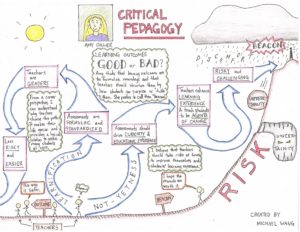This blog post is a response to the interview conducted by Chris Friend with Amy Collier regarding critical digital pedagogy and the concept of not yet-ness. My thoughts and the key points presented in the podcast are briefly summarized in my sketchnote. I choose to do a sketchnote for this post partially because of the structure of the interview. In the interview, the concept of not yet-ness is the main focus. Not yet-ness is simply a term used to describe the feeling of trying something new but not really getting what is going on. In a pedagogical sense, it can refer to teachers trying new and riskier teaching methods without fully getting or understanding the end result. Throughout the interview, Amy contrasts this teaching method with the traditional pedagogy, which can be described as learnification. Learnification refers to the transition from teaching to learning at higher education. It also places an emphasis on individualized learning. Therefore, my sketchnote highlights the defining features of each pedagogical method as two paths that new teachers can travel down. I want to present a contrast in my multimedia reflection as described in the podcast.

The key difference between learnification and not yet-ness is presence of risk. The traditional and commonly used method “de-risk” the situation as Amy describes it. Students are assessed similarly and learning outcomes are formulaic. Teachers can efficiently assess the students and the risk of things going wrong is much lower because all the variables are removed. In a sense, having something stable and unchanging is very appealing in consideration of one’s career. From my perspective, I do believe that the concept of learnification is faulty. However, I do not believe that all the connotations attached to it are bad. For example, formulaic assessments may not totally be a bad thing. At higher education, when class sizes become too large, it becomes incredibly inefficient to consider and satisfy the needs of individual students. I believe that teachers and professors do consider this when formulating their learning outcomes and designing their lesson plans. However, this does not mean that teachers cannot engage in risk-taking from time to time (from what I learned in Pedagogy of the Arts course, risk-taking is the best form of learning). I believe that good teachers do take risks at times, to design lesson plans and learning outcomes that excite the student and themselves as a result of students’ work. I strongly agree with Amy that teachers should drive curiosity and improve the educational experience of students. With not yet-ness, teachers have a lot of room to grow and reflect through mistakes and uncertainties (self-reflection is incredibly important for effective teaching as highlighted in Philosophy course). If I must summarize my point of view, I will say that different situation calls for different needs. Good teachers will know how to differentiate between the two and take the correct path when needed to improve learning for students.
The other reason I choose to do a sketchnote is because I want to try out a new form of “note-taking”. Throughout my academic career, I have taken many notes but doing a sketchnote makes me realize that adding a visual element can really make my notes and points appealing to readers (including myself). With sketchnote, I learn how to effectively summarize the key ideas and points and demonstrate the link between various aspects of the presentation. I notice that I retain the information much easier than with a text-only note. With the increasing demand that teachers be more digitally literate, I believe that this multimedia reflection gives me a great opportunity to try out a different form of response and develop my skills in this area. I hope to improve myself in sketchnoting and in other platforms that I may use in the future.
Edit: Added link to interview
Edit 2: From all the wonderful comments below, I just want to say that sketchnote is definitely a consideration for me when it comes to teaching. I am not sure how it will work yet, but I guess this reinforces the point that Amy Collier makes when it comes to critical pedagogy, that new teachers take risks and try something new. In a sense, that sensation can be described as not yet-ness.
